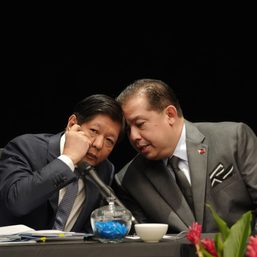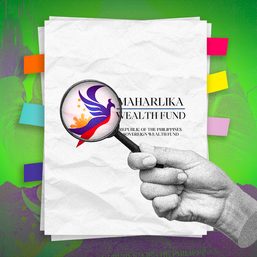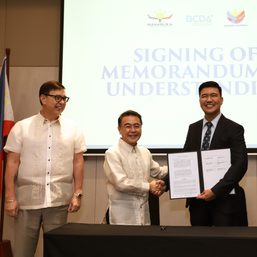SUMMARY
This is AI generated summarization, which may have errors. For context, always refer to the full article.

MANILA, Philippines – During his second State of the Nation Address (SONA) in July, President Ferdinand Marcos Jr. outlined key legislative priorities for his administration, giving emphasis on enhancing the Philippine economy and implementing financial and governmental reforms.
The Marcos administration has 17 priority pieces of legislation, most of which have secured approval in the lower house and are presently under review in their respective Senate committees. These include:
- Creation of the Department of Water Resources Management (Pending at Senate committee level)
- Military and Uniformed Personnel Pension (Approved in House of Representatives; pending in the Senate, second reading)
- Amendment of the Anti-Agricultural Smuggling Act (Pending in Senate)
- Ease of Paying Taxes bill (For enrollment)
- LGU Income Classification Act (Enacted)
- The Philippine Immigration Act (Approved in the House of Representatives)
- Tatak Pinoy (Proudly Filipino) law (For enrollment)
- Anti-financial accounts scamming (Pending at Senate committee level)
- The Blue Economy law (Pending in Senate, second reading)
- New Government Auditing Code
- Motor vehicle user’s charge/road user’s tax (Pending at Senate committee level)
- New Government Procurement Law (Pending at Senate committee level)
- Excise tax on single-use plastics (Pending at Senate committee level)
- Amendment of the Cooperative Code (Approved in the House of Representatives)
- Amendment of the Fisheries Code
- VAT on digital services (Pending at Senate committee level)
- Rationalization of mining fiscal regime (Approved in House of Representatives)
However, only one out of 17 bills has so far come to fruition in Marcos’ second year. Overall, Marcos laid down 74 priority bills since he assumed office last year, but only 10 have so far been signed into law.
Take a look at some of these bills and how the Marcos administration has followed through on its legislative agenda during its one-and-a-half year in office.
LGU Income Classification Act
Signed in October, the Republic Act (RA) 11964 institutionalizes the automatic income classification of local government units (LGUs).
Under this legislation, the Department of Finance (DOF) is tasked with the automatic classification of provinces, cities, and municipalities into five income classes.
The income brackets for provinces are as follows:
- First Class: P1.5 billion or more
- Second Class: P900 million but less than P1.5 billion
- Third Class: P700 million but less than P900 million
- Fourth Class: P500 million but less than P700 million
- Fifth Class: Less than P500 million
The income brackets for cities are as follows:
- First Class: P1.3 billion or more
- Second Class: P1 billion but less than P1.3 billion
- Third Class: P800 million but less than P1 billion
- Fourth Class: P500 million but less than P800 million
- Fifth Class: Less than P500 million
The income brackets for municipalities are as follows:
- First Class: P200 million or more
- Second Class: P160 million or more, but less than P200 million
- Third Class: P130 million or more, but less than P160 million
- Fourth Class: P90 million or more, but less than P130 million
- Fifth Class: Less than P90 million
The legislation also mandates a regular reassessment and adjustment of the income classification of LGUs every three years to accurately mirror shifts in the economy and local development.
Ease of Paying Taxes bill, Tatak Pinoy bill
Two bills from the SONA 2023 list are also currently awaiting the President’s approval. These are the Ease of Paying Taxes bill and the Tatak Pinoy (Proudly Filipino) bill.
The proposed Ease of Paying Taxes bill aims to streamline the tax system and boost citizen’s compliance through key measures: the bill simplifies tax filing for micro and small businesses, introducing an only 2-page income tax return, reduced penalties, and eliminating specific withholding taxes.
If passed, it will also mandate the Bureau of Internal Revenue (BIR) to develop a digital platform for tax filing and payment, enhancing efficiency in tax administration and establishing taxpayer assistance centers and hotlines to facilitate compliance.
The bill also aims to exempt Overseas Filipino Workers (OFWs) earning below a set income threshold from filing income tax returns.
In September, both the Senate and the House of Representatives ratified the report of the bicameral conference committee, which resolved discrepancies in their individual versions of the proposed Ease of Paying Taxes bill.
Later this year, both Houses also passed their respective versions of the Tatak Pinoy bill (Senate bill 2218 and House bill 8601), with the goal of boosting the international competitiveness of Philippine products and services, particularly those produced by small and medium-sized enterprises (SMEs).
Tatak Pinoy bill aims to support the diversification and advancement of domestic production, generate jobs especially in rural regions, and lower dependence on imported goods while fostering economic self-sufficiency.
New Agrarian Emancipation Act
Before his second SONA, Marcos signed Republic Act 11953 or the New Agrarian Emancipation Act which aims to offer assistance to agrarian reform beneficiaries (ARBs) grappling with debt from previous agrarian reform initiatives. (READ: Will the New Agrarian Emancipation Act liberate Filipino farmers and boost PH agriculture?)
The act pardons all outstanding amortizations, interests, and surcharges accumulated by ARBs on lands granted to them under Presidential Decree (PD) 27, Republic Act 6657 or the Comprehensive Agrarian Reform Law, and RA 9700 or the Extension of the Comprehensive Agrarian Reform Program.
This measure clears the financial slate for 600,000 ARBs.
Maharlika Investment law
Despite facing significant backlash, the Marcos administration proceeded to enact the controversial Republic Act 11954, also known as the Maharlika Investment Law, which established the Maharlika Investment Fund (MIF), the country’s first sovereign wealth fund (READ: FAST FACTS: What is the Maharlika Investment Fund?)
According to the law, the primary objective of the MIF is to establish a safeguard against economic downturns and ensure financial stability for future generations. Supporters of the MIF argued that it would enhance financial security by setting aside a portion of the government’s revenue and making prudent investments.
Yet, prior to its approval, strong concerns persisted regarding the fund’s transparency and accountability process.
Critics said that the law seemed to prioritize private investment over social development objectives. Some also voiced concerns about potential misuse of the fund and the absence of safeguards for Filipino taxpayers. (READ: Experts worry about Maharlika fund’s impact on independence of Bangko Sentral)
Internet Transaction Act
This year, the Marcos administration introduced Republic Act 11967, also known as the Internet Transactions Act of 2023 (ITA), to regulate and foster the growth of e-commerce in the country.
Key features of the law include cracking down on unfair trade practices, enforcing product safety standards, improving dispute resolution, and ensuring transparency from sellers regarding product information, prices, and terms of sale.
Trabaho Para sa Bayan Act
Republic Act 11962, known as the Trabaho Para sa Bayan Act, is the National Employment Master Plan for the Philippines. Signed into law in September, the law aims to create a more comprehensive and effective approach to employment generation and job creation in the country.
The Trabaho Para sa Bayan Inter-Agency Council, headed by the National Economic and Development Authority, is tasked with formulating a comprehensive plan for job creation and economic recovery. This plan will outline development timelines spanning three, six, and ten years.
While a number of laws, mostly economic in nature, have been passed since Marcos came to power, most of his legislative agenda remains pending in Congress. In fact, nine of the 17 priority bills he stated during the second SONA, were carried over from the first SONA.
For instance, the bill reforming the generous but costly pension system for military and uniformed personnel has only recently passed the lower house’s scrutiny. (READ: EXPLAINER: How generous military pension is pushing Philippines to fiscal collapse)
Meanwhile, the proposed 12% value-added tax (VAT) in digital services like Netflix and Disney+ also remains pending in the Senate. – Rappler.com
Add a comment
How does this make you feel?
![[In This Economy] Marcos’ POGO ban is popular, but will it work?](https://www.rappler.com/tachyon/2024/07/thought-leaders-marcos-pogo-ban.jpg?resize=257%2C257&crop=255px%2C0px%2C720px%2C720px)
![[Rappler Investigates] POGOs no-go as Typhoon Carina exits](https://www.rappler.com/tachyon/2024/07/newsletter-graphics-carina-pogo.jpg?resize=257%2C257&crop=424px%2C0px%2C1080px%2C1080px)













![[Just Saying] SONA 2024: Some disturbing points](https://www.rappler.com/tachyon/2024/07/TL-marcos-sona-points-july-23-2024.jpg?resize=257%2C257&crop=335px%2C0px%2C720px%2C720px)










![[WATCH] Bamban POGO scandal: There’s a bigger fish than Alice Guo](https://www.rappler.com/tachyon/2024/07/inside-track-tcard-bamban-pogo.jpg?resize=257%2C257&crop=435px%2C0px%2C1080px%2C1080px)

![[Rappler’s Best] Knowing when to leave](https://www.rappler.com/tachyon/2024/07/biden-sara-gfx.jpg?resize=257%2C257&crop_strategy=attention)


![[Be The Good] Weave your story into the state of the nation](https://www.rappler.com/tachyon/2024/07/newsletter-marcos-sona-july-17-2024.jpg?resize=257%2C257&crop=275px%2C0px%2C720px%2C720px)
There are no comments yet. Add your comment to start the conversation.